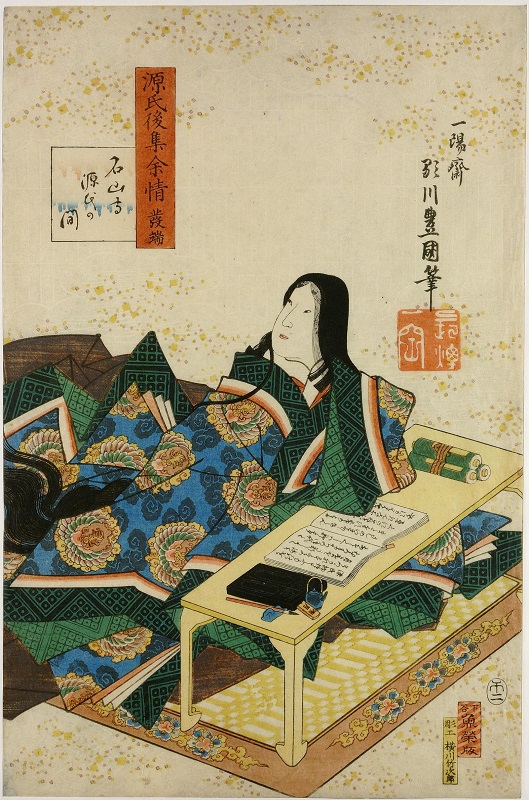
Murasaki Shikibu at her desk. Woodblock print, 1858, Utagawa Kunisada. © The Trustees of the British Museum.
Women in Classical Japanese Literature
- 31 March 2021
- 2:00pm-3:00pm (BST)
- Online
- https://dajf.org.uk/event/women-in-classical-japanese-literature
- events@dajf.org.uk
- Tweet
Around 1000 CE in the city now known as Kyoto, two women, rivals, were working on ground-breaking literary projects. Murasaki Shikibu was writing the Tale of Genji, which has become the great classic of Japanese literature; a prose piece viewed by some as the world’s first novel (three quarters of a millennium before the rise of women novelists in Britain), it was avidly consumed by her contemporaries in the Emperor’s court. Sei Shōnagon’s work was the Pillow Book, a miscellaneous collection of anecdotes, musings, and lists, ostensibly intended only for herself but even during her lifetime it became another highly popular work at court.
Murasaki and Shōnagon were remarkable for the brilliance and enduring popularity of their work; that they were writing at all was, however, unremarkable in their sociohistorical context. The ‘Japan’ in which they lived, and in particular the aristocratic world centred around the court in the old capital, was scene of a great cultural flourishing, an era of literary and artistic output unrivalled anywhere in the world. Women, though living in an otherwise highly oppressive patriarchal society, were just as significant in this literary environment. Elite interaction, both personal and political, was conducted through the medium of poetry, and the canon of great literary works from this period is dominated by female poets, the authors mentioned above, and a number of notable diarists.
In this webinar we will explore this extraordinary era of women’s writing with reference to the seminal works of Murasaki and Shōnagon: Professor Haruo Shirane will seek to answer the question “Why did a woman write the Tale of Genji in the 11th century?”, while Dr Jennifer Guest will discuss literary education for women, including how early women writers interacted with Chinese texts, using the Pillow Book as her main example.
Date: Wednesday 31 March 2021
UK Time: 2:00pm-3:00pm (BST)
US East Coast Time: 9:00am-10:00am (GMT-4)
Japan Time: 10:00pm-11:00pm (GMT+9)
About the contributors
Professor Haruo Shirane is Shincho Professor of Japanese Literature and Culture and chair of the Department of East Asian Languages and Cultures at Columbia University. He teaches and writes on premodern and early modern Japanese literature and culture, with particular interest in prose fiction, poetry, performative genres (such as storytelling and theater), and visual culture. In 2019 he was selected as first recipient of the NIHU International Prize in Japanese Studies for outstanding achievement in the field of Japanese scholarship outside Japan. He has published extensively in English and Japanese, with notable recent works including Reading The Tale of Genji: The First Millennium (Columbia University Press, 2015) and Japan and the Culture of the Four Seasons (Columbia University Press, 2012). He is currently working on a project titled Ghosts, Demons, and Other Worlds in Japanese Literature.
Dr Jennifer Guest is Associate Professor of Japanese at the University of Oxford and a fellow of the Queen’s College, where she teaches topics in classical Japanese language and literature. Her research focuses on the reception of Chinese texts and modes of writing in early Japan, particularly within court culture of the tenth to thirteenth centuries, and of crucial developments in poetic and literary thought. She is interested in the practices of literacy, education, and commentary surrounding Chinese-style texts, in the varied ways that premodern Japanese readers and writers used these texts as a creative resource, and in comparative approaches to thinking about translation and the spread of literary languages; recent projects range from an article on storytelling and wordplay in medieval Japanese poetic commentaries to a collaborative book project on translation in East Asia.
BOOK YOUR PLACE
